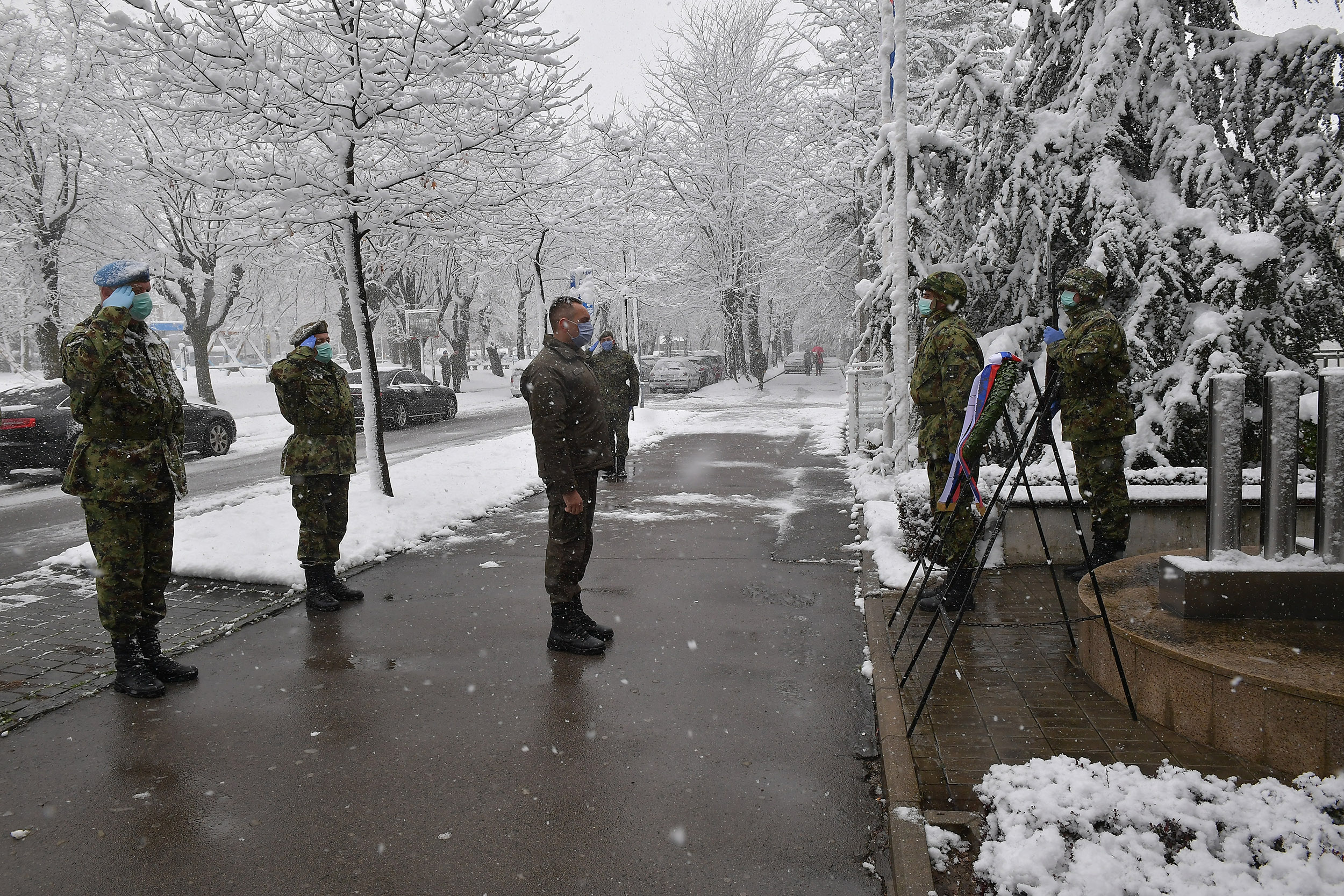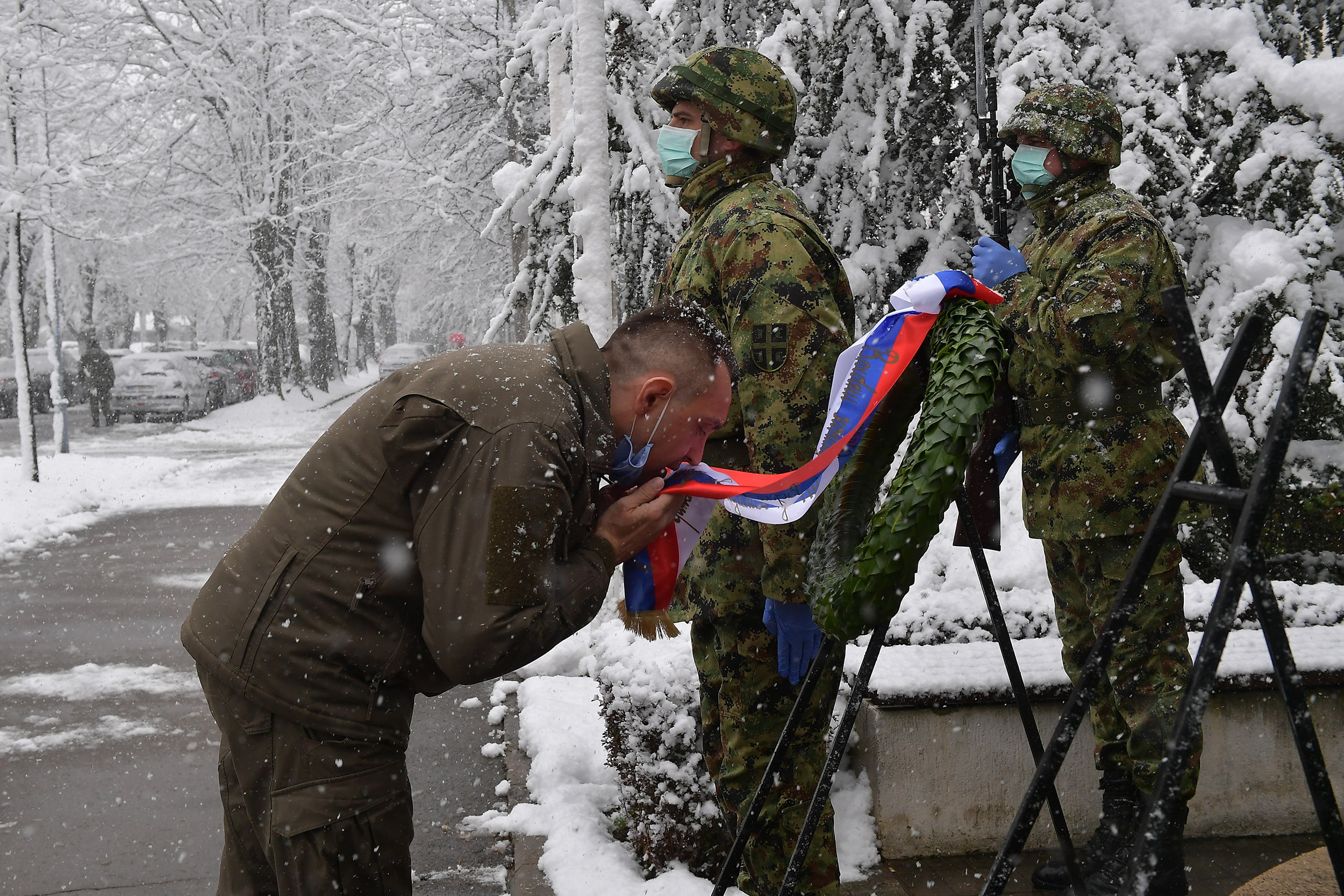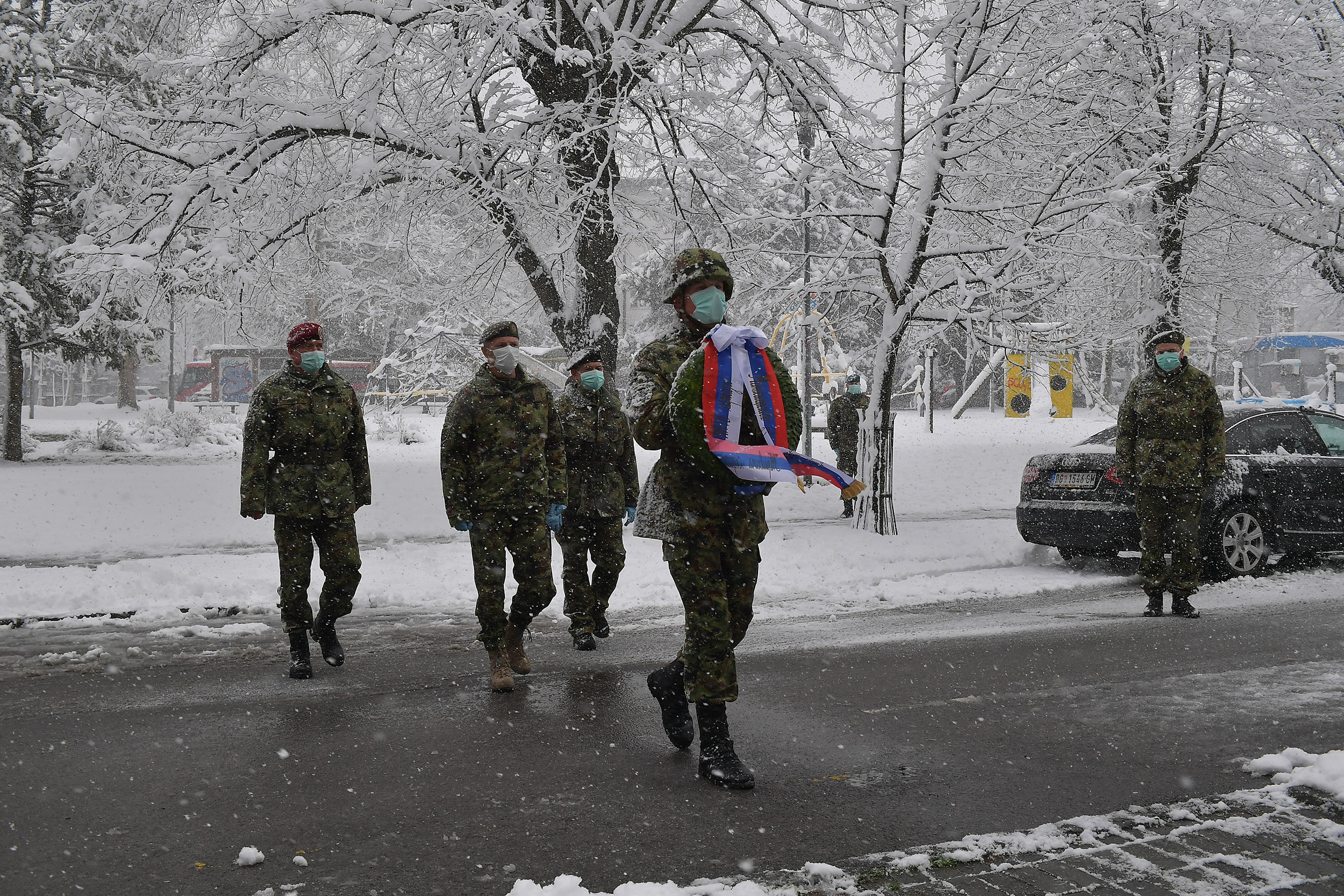24.03.2020.
Minister Vulin: NATO aggression was the last major and unpunished crime in the 20th century
The Minister of Defence Aleksandar Vulin - the Envoy of the President of the Republic and the Supreme Commander of the Serbian Armed Forces, Aleksandar Vučić, laid a wreath today at the memorial in front of the Clinical Hospital Centre "Dragiša Mišović" to commemorate the deaths of the members of the Guard and the patients who died at the facility during the 1999 NATO aggression. The Chief of the General Staff of the Serbian Armed Forces, General Milan Mojsilović laid the wreath on behalf of the members of the Serbian Armed Forces.
Twenty-one years ago today, NATO aggression against our country started.
After the wreath-laying ceremony at the memorial in front of the Clinical Hospital Centre "Dragiša Mišović", the Minister of Defence Aleksandar Vulin pointed out that NATO aggression was the last major and unfortunately unpunished crime in the 20th century.
 - Two thousand five hundred soldiers, police officers, civilians and children were killed. No one was ever prosecuted for that, no one ever apologized, no one ever felt sorry for our killed soldiers and police officers. Sometimes they said they were sorry for the civilians, but as far as the killed soldiers and police officers were concerned, no one had ever said they felt sorry or that it was a huge crime - Minister Vulin emphasized.
- Two thousand five hundred soldiers, police officers, civilians and children were killed. No one was ever prosecuted for that, no one ever apologized, no one ever felt sorry for our killed soldiers and police officers. Sometimes they said they were sorry for the civilians, but as far as the killed soldiers and police officers were concerned, no one had ever said they felt sorry or that it was a huge crime - Minister Vulin emphasized.According to him, no one has the right to kill a child, just as no one has the right to kill a soldier or a police officer in a free sovereign country.
- We will not stop remembering, we will not stop reminding, we will not stop asking why the Federal Republic of Yugoslavia was attacked without a decision of the Security Council, without justification under international law. Twenty-one years ago, they tried to kill Serbia, and they succeeded in killing international law. Our country is still struggling to regain its entitlement of the territory of Kosovo and Metohija, our country is still fighting for its right to know who ordered this horrific bombing and why no one has ever been held responsible or found guilty of all the crimes, all the destruction, death and devastation - Minister Vulin reminded.
Like 21 years ago, we are still facing the threat of physical disappearance today, the Minister of Defence stressed.
 - Like 21 years ago, we have to be united and harmonious, to rely on ourselves only, and to be aware of the fact that we are each other's best friends, and the strongest barrier against disaster and the only guarantee of survival. Twenty-one years ago, the people, the military and the state were united and that is why we survived. And today, 21 years later, faced with the coronavirus, we have to be united, because that is the only way for us to survive so that we can remember, seek justice, and fight. We must survive. Serbs, stay with your country, your state, like you did 21 years ago. That is the only way for us to survive and leave this country to future generations - Minister Vulin said.
- Like 21 years ago, we have to be united and harmonious, to rely on ourselves only, and to be aware of the fact that we are each other's best friends, and the strongest barrier against disaster and the only guarantee of survival. Twenty-one years ago, the people, the military and the state were united and that is why we survived. And today, 21 years later, faced with the coronavirus, we have to be united, because that is the only way for us to survive so that we can remember, seek justice, and fight. We must survive. Serbs, stay with your country, your state, like you did 21 years ago. That is the only way for us to survive and leave this country to future generations - Minister Vulin said.The delegation of the Serbian Armed Forces that came to the spot where the soldiers of the Guard Brigade lost their lives, in front of the "Dr Dragiša Mišović"
Hospital, consisted of the Commander of the Guard, Major General Milomir Todorović, the Head of the Human Resources Department , Brigadier General Savo Iriškić and the Head of the Military Police Department, Brigadier General Rajko Milovanović.
The NATO aggressor bombed the hospital in Belgrade, killing seven members of the Guard and three patients. The laying of wreaths in front of the Clinical Hospital Centre “Dragiša Mišović” marked the anniversary of the beginning of NATO aggression against our country, which began 21 years ago today.
 The NATO aggression of 19 member states of the Western military alliance, called "Allied Force," began on the evening of 24 March, 1999. More than 3,500 were killed and more than 12,500 people were injured and wounded. In the 78 days of the aggression, 2,500 civilians were killed, including 89 children and 1,031 members of the Armed Forces and the Police Force. About 6,000 civilians were seriously or mildly injured, including 2,700 children, as well as 5,173 soldiers and police officers, while 25 persons are still missing.
The NATO aggression of 19 member states of the Western military alliance, called "Allied Force," began on the evening of 24 March, 1999. More than 3,500 were killed and more than 12,500 people were injured and wounded. In the 78 days of the aggression, 2,500 civilians were killed, including 89 children and 1,031 members of the Armed Forces and the Police Force. About 6,000 civilians were seriously or mildly injured, including 2,700 children, as well as 5,173 soldiers and police officers, while 25 persons are still missing.The decision on the aggression against the former SFRY was made without the approval of the United Nations Security Council.
The bombing has severely damaged business facilities, schools, healthcare facilities, infrastructure, media offices and cultural monuments. According to the data of the Construction Directorate of Serbia, 54 road infrastructure objects (44 of which bridges), 18 railway infrastructure objects (17 bridges) and 148 high-rise buildings (residential and public buildings) were destroyed. Commercial buildings and private houses are not included in this record.
It is estimated that 10-15 tonnes of depleted uranium were dropped in 78 days of bombing, which continues to threaten citizens' health.
Members of the armed forces, but also the citizens, defended the country by all means available and achieved the seemingly impossible. The 3rd Missile Division of the 250th AD Missile Brigade of the Yugoslav Armed Forces shot down the famous American F-117A Stealth Fighter.
The aggression ended with the Kumanovo Military Technical Agreement and the signing of United Nations Security Council Resolution 1244.
Remembrance Day commemorating the victims of NATO aggression is marked today in the commands, units and institutions of the Serbian Armed Forces, and the members of the Ministry of Defence and the Serbian Armed Forces will take part in the marking of Remembrance Day at the local level as well.




